AWM41 1072 - [Official History, 1914-18 War: Records of Arthur G Butler:] Interviews containing accounts of Nursing experiences in the AANS [Australian Army Nursing Service]. These nurses were interviewed by Matron Kellett - Part 13
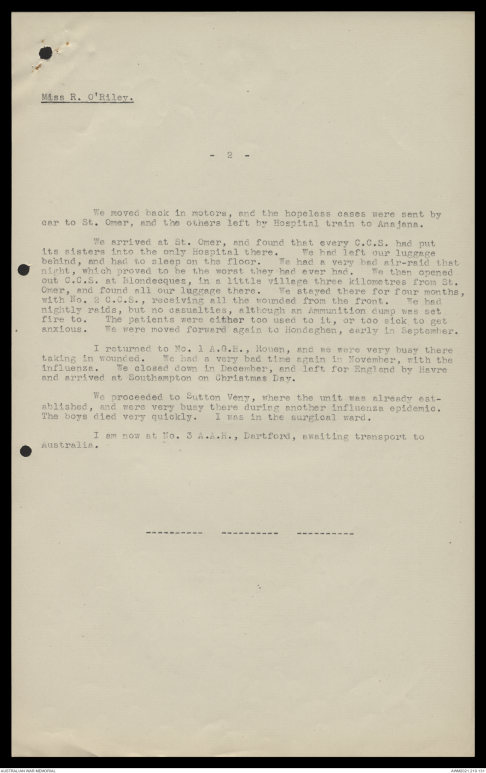
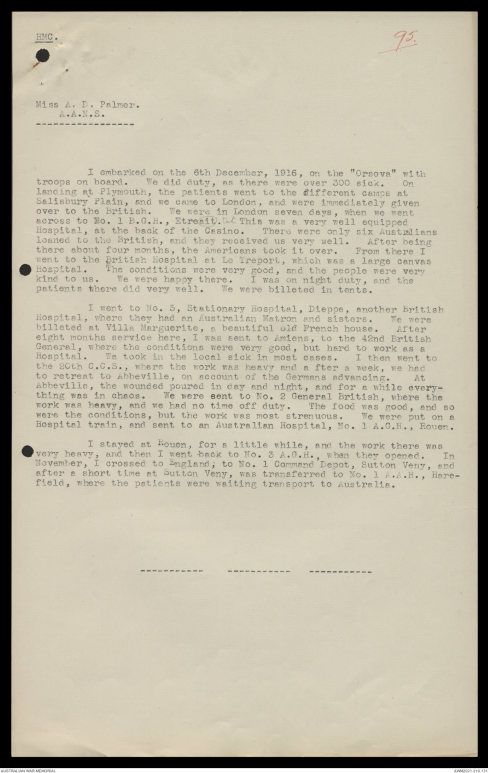
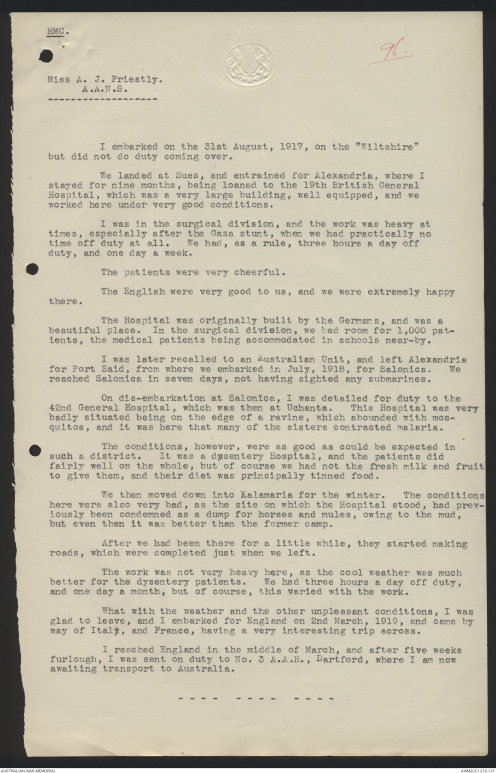
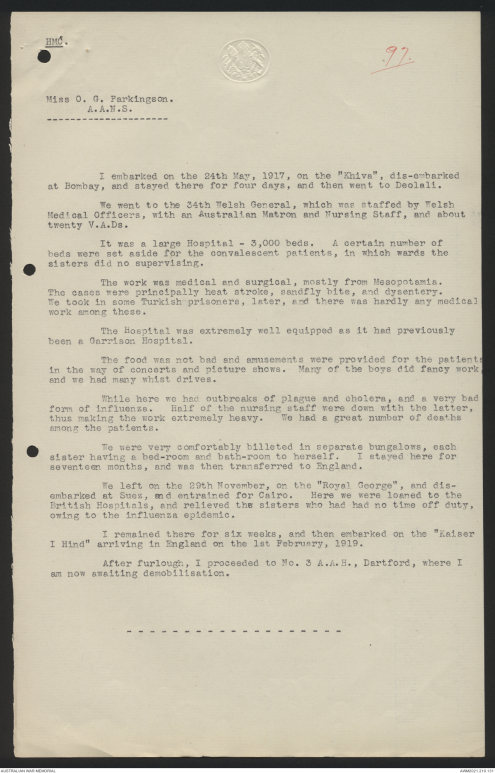
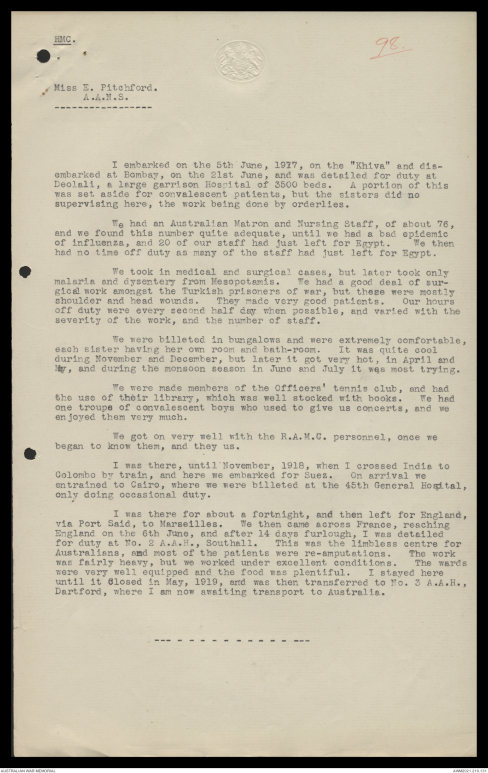
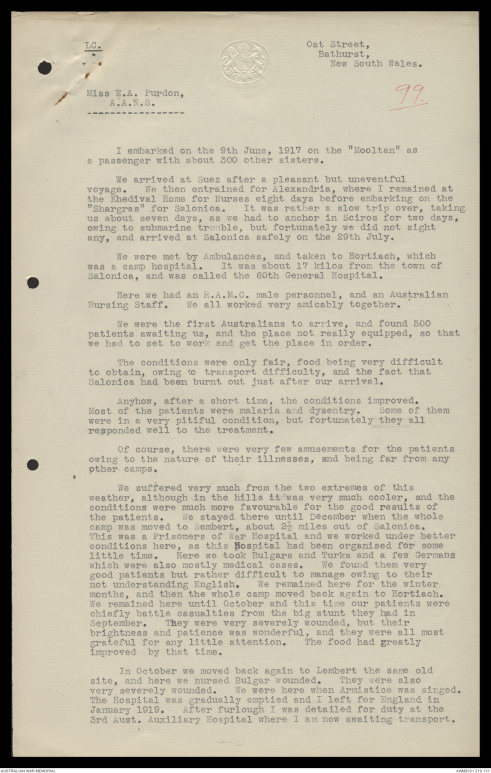
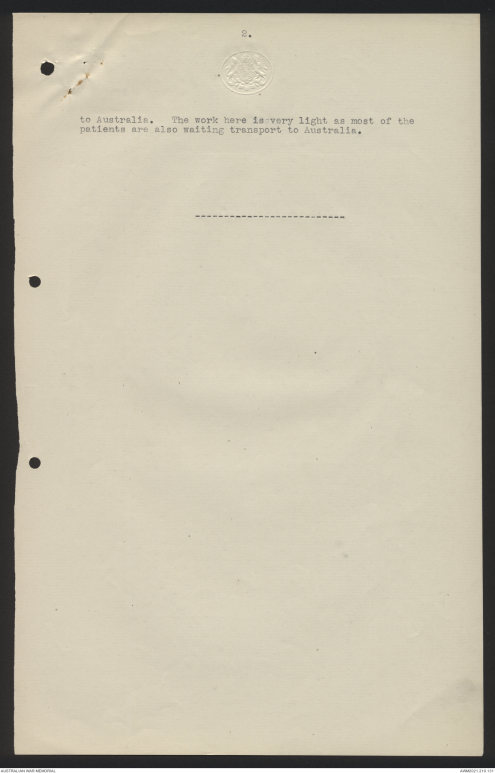
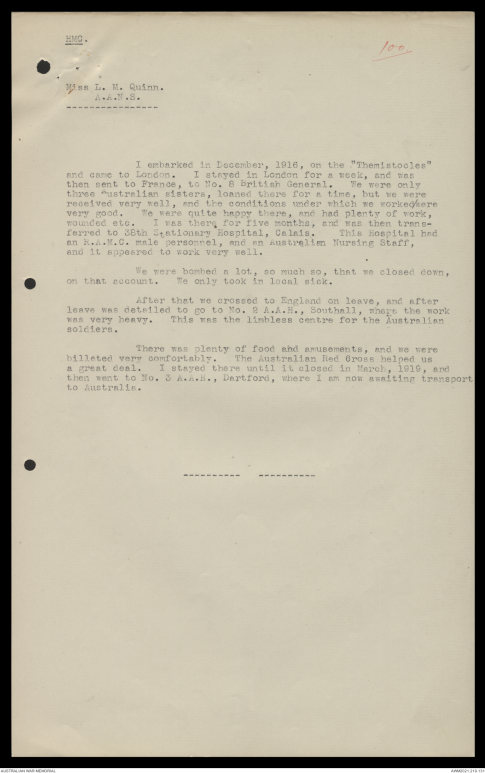
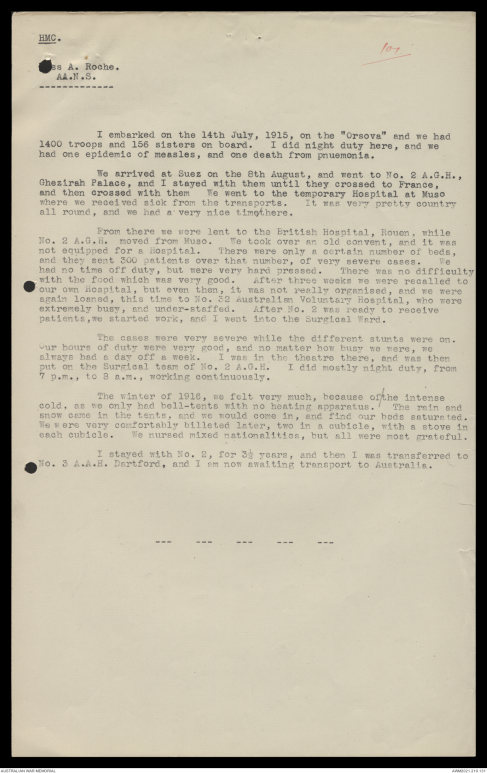
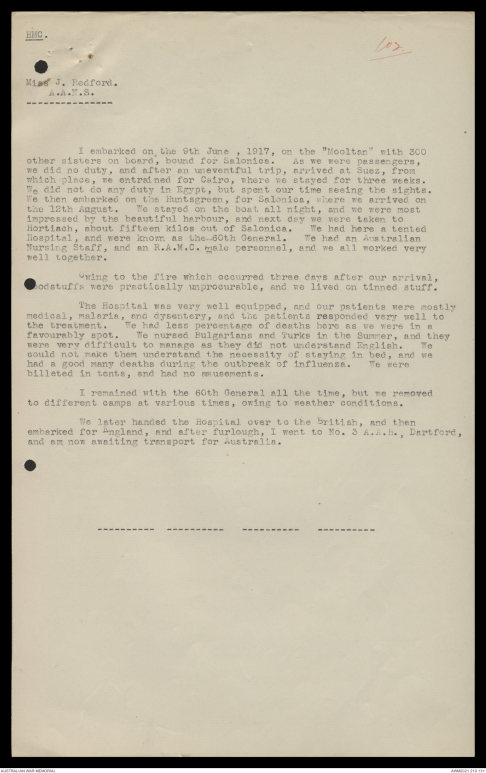
Miss R. O'Riley.
- 2 -
We moved back in motors, and the hopeless cases were sent by
car to St. Omer, and the others left by Hospital train to Anajana.
We arrived at St. Omer, and found that every C.C.S. had put
its sisters into the only Hospital there. We had left our luggage
behind, and had to sleep on the floor. We had a very bad air-raid that
night, which proved to be the worst they had ever had. We then opened
out C.C.S. at Blondecques, in a little village three kilometres from St.
Omer, and found all our luggage there. We stayed there for four months,
with No. 2 C.C.S., receiving all the wounded from the front. We had
nightly raids, but no casualties, although an Ammunition camp was set
fire to. The patients were either too used to it, or too sick to get
anxious. We were moved forward again to Hondeghen, early in September.
I returned to No. 1 A.G.H., Rouen, and we were very busy there
taking in wounded. We had a very bad time again in November, with the
influenza. We closed down in December, and left for England by Havre
and arrived at Southampton on Christmas Day.
We proceeded to Sutton Veny, where the unit was already established,
and were very busy there during another influenza epidemic.
The boys died very quickly. I was in the surgical ward.
I am now at No. 3 A.A.H., Dartford, awaiting transport to
Australia.
HMC.
95.
Miss A.D. Palmer.
A.A.N.S.
- - - - - - - - - - - - -
I embarked on the 6th December, 1916, on the "Orsova" with
troops on board. We did duty, as there were over 300 sick. On
landing at Plymouth, the patients went to the different camps at
Salisbury Plain, and we came to London, and were immediately given
over to the British. We were in London seven days, when we went
across to No. 1 B.G.H., Etrenit. tat This was a very well equipped
Hospital, at the back of the Casino. There were only six Australians
loaned to the British, and they received us very well. After being
there about four months, the Americans took it over. From there I
went to the British Hospital at Le Treport, which was a large canvas
Hospital. The conditions were very good, and the people were very
kind to us. We were happy there. I was on night duty, and the
patients there did very well. We were billeted in tents.
I went to No. 5, Stationary Hospital, Dieppe, another British
Hospital, where they had an Australian Matron and sisters. We were
billeted at Villa Marguerite, a beautiful old French house. After
eight months service here, I was sent to Amiens, to the 42nd British
General, where the conditions were very good, but hard to work as a
Hospital. We took in the local sick in most cases. I then went to
the 20th C.C.S., where the work was heavy and a fter a week, we had
to retreat to Abbeville, on account of the Germans advancing. At
Abbeville, the wounded poured in day and night, and for a while everything
was in chaos. We were sent to No. 2 General British, where the
work was heavy, and we had no time off duty. The food was good, and so
were the conditions, but the work was most strenuous. We were put on a
Hospital train, and sent to an Australian Hospital, No. 1 A.G.H., Rouen.
I stayed at Rouen, for a little while, and the work there was
very heavy, and then I went back to No. 3 A.G.H., when they opened. In
November, I crossed to England, to No. 1 Command Depot, Sutton Veny, and
after a short time at Sutton Veny, was transferred to No. 1 A.A.H., Harefield,
where the patients were waiting transport to Australia.
HMC.
96.
Miss A.J. Priestly.
A.A.N.S.
- - - - - - - - - - - - -
I embarked on the 31st August, 1917, on the "Wiltshire"
but did not do duty coming over.
We landed at Suez, and entrained for Alexandria, where I
stayed for nine months, being loaned to the 19th British General
Hospital, which was a very large building, well equipped, and we
worked here under very good conditions.
I was in the surgical division, and the work was heavy at
times, especially after the Gaza stunt, when we had practically no
time off duty at all. We had, as a rule, three hours a day off
duty, and one day a week.
The patients were very cheerful.
The English were very good to us, and we were extremely happy
there.
The Hospital was originally built by the Germans, and was a
beautiful place. In the surgical division, we had room for 1,000 patients,
the medical patients being accommodated in schools near-by.
I was later recalled to an Australian Unit, and left Alexandria
for Port Said, from where we embarked in July, 1918, for Salonica. We
reached Salonica in seven days, not having sighted any submarines.
On dis-embarkation at Salonica, I was detailed for duty to the
42nd General Hospital, which was then at Uchanta. This Hospital was very
badly situated being on the edge of ravine, which abounded with mosquitos,
and it was here that many of the sisters contracted malaria.
The conditions, however, were as good as could be expected in
such a district. It was a dysentery Hospital, and the patients did
fairly well on the whole, but of course we had not the fresh milk and fruit
to give them, and their diet was principally tinned food.
We then moved down into Kalamaria for the winter. The conditions
here were also very bad, as the site on which the Hospital stood, had previously
been condemned as a dump for horses and mules, owing to the mud,
but even then it was better than the former camp.
After we had been there for a little while, they started making
roads, which were completed just when we left.
The work was not very heavy here, as the cool weather was much
better for the dysentery patients. We had three hours a day off duty
and one day a month, but of course, this varied with the work.
What with the weather and the other unpleasant conditions, I was
glad to leave, and I embarked for England on 2nd March, 1919, and came by
way of Italy, and France, having a very interesting trip across.
I reached England in the middle of March, and after five weeks
furlough, I was sent on duty to No. 3 A.A.H., Dartford, where I am now
awaiting transport to Australia.
HMC.
97.
Miss O.G. Parkingson.
A.A.N.S.
- - - - - - - - - - - - - - - - -
I embarked on the 24th May, 1917, on the "Khiva", dis-embarked
at Bombay, and stayed there for four days, and then went to Deolali.
We went to the 34th Welsh General, which was staffed by Welsh
Medical Officers, with an Australian Matron and Nursing Staff, and about
twenty V.A.Ds.
It was a large Hospital - 3,000 beds. A certain number of
beds were set aside for the convalescent patients, in which wards the
sisters did no supervising.
The work was medical and surgical, mostly from Mesopotamia.
The cases were principally heat stroke, sandfly bite, and dysentery.
We took in some Turkish prisoners, later, and there was hardly any medical
work among these.
The Hospital was extremely well equipped as it had previously
been a Garrison Hospital.
The food was not bad and amusements were provided for the patients
in the way of concerts and picture shows. Many of the boys did fancy work
and we had many whist drives.
While here we had outbreaks of plague and cholera, and a very bad
form of influenza. Half of the nursing staff were down with the latter,
thus making the work extremely heavy. We had a great number of deaths
among the patients.
We were very comfortably billeted in separate bungalows, each
sister having a bed-room and bath-room to herself. I stayed here for
seventeen months, and was then transferred to England.
We left on the 29th November, on the "Royal George", and disembarked
at Suez, and entrained for Cairo. Here we were loaned to the
British Hospitals, and relieved the sisters who had had no time off duty,
owing to the influenza epidemic.
I remained there for six weeks, and then embarked on the "Kaiser
1 Hind" arriving in England on the 1st February, 1919.
After furlough, I proceeded to No. 3 A.A.H., Dartford, where I
am now awaiting demobilisation.
HMC.
98.
Miss E. Pitchford.
A.A.N.S.
- - - - - - - - - - - - -
I embarked on the 5th June, 1917, on the "Khiva" and disembarked
at Bombay, on the 21st June, and was detailed for duty at
Deolali, a large garrison Hospital of 3500 beds. A portion of this
was set aside for convalescent patients, but the sisters did no
supervising here, the work being done by orderlies.
We had an Australian Matron and Nursing Staff, of about 76,
and we found this number quite adequate, until we had a bad epidemic
of influenza, and 20 of our staff had just left for Egypt. We then
had no time off duty as many of the staff had just left for Egypt.
We took in medical and surgical cases, but later took only
malaria and dysentery from Mesopotamia. We had a good deal of surgical
work amongst the Turkish prisoners of war, but there were mostly
shoulder and head wounds. They made very good patients. Our hours
off duty were every second half day when possible, and varied with the
severity of the work, and the number of staff.
We were billeted in bungalows and were extremely comfortable,
each sister having her own room and bath-room. It was quite cool
during November and December, but later it got very hot, in April and
May, and during the monsoon season in June and July it was most trying.
We were made members of the Officers' tennis club, and had
the use of their library, which was well stocked with books. We had
one troupe of convalescent boys who used to give us concerts, and we
enjoyed them very much.
We got on very well with the R.A.M.C. personnel, once we
began to know them, and they us.
I was there, until November, 1918, when I crossed India to
Colombo by train, and here we embarked for Suez. On arrival we
entrained to Cairo, where we were billeted at the 45th General Hospital,
only doing occasional duty.
I was there for about a fortnight, and then left for England,
via Port Said, to Marseilles. We then came across France, reaching
England on the 6th June, and after 14 days furlough, I was detailed
for duty at No. 2 A.A.H., Southall. This was the limbless centre for
Australians, and most of the patients were re-amputations. The work
was fairly heavy, but we worked under excellent conditions. The wards
were very well equipped and the food was plentiful. I stayed here
until it closed in May, 1919, and was then transferred to No. 3 A.A.H.,
Dartford, where I am now awaiting transport to Australia.
LC.
Oat Street,
Bathurst,
New South Wales.
Miss E.A. Purdon,
A.A.N.S.
- - - - - - - - - - - - - -
99.
I embarked on the 9th June, 1917 on the "Mooltan" as
a passenger with about 300 other sisters.
We arrived at Suez after a pleasant but uneventful
voyage. We then entrained for Alexandria, where I remained at
the Khedival Home for Nurses eight days before embarking on the
"Shargras" for Salonica. It was rather a slow trip over, taking
us about seven days, as we had to anchor in Sciros for two days,
owing to submarine trouble, but fortunately we did not sight
any, and arrived at Salonica safely on the 29th July.
We were met by Ambulances, and taken to Hortiach, which
was a camp hospital. It was about 17 kilos from the town of
Salonica, and was called the 60th General Hospital.
Here we had an R.A.M.C. male personnel, and an Australian
Nursing Staff. We all worked very amicably together.
We were the first Australians to arrive, and found 500
patients awaiting us, and the place not really equipped, so that
we had to set to work and get the place in order.
The conditions were only fair, food being very difficult
to obtain, owing to transport difficulty, and the fact that
Salonica had been burnt out just after our arrival.
Anyhow, after a short time, the conditions improved.
Most of the patients were malaria and dysentry. Some of them
were in a very pitiful condition, but fortunately they all
responded well to the treatment.
Of course, there were very few amusements for the patients
owing to the nature of their illnesses, and being far from any
other camps.
We suffered very much from the two extremes of this
weather, although in the hills it was very much cooler, and the
conditions were much more favourable for the good results of
the patients. We stayed there until December when the whole
camp was moved to Sembert, about 2½ miles out of Salonica.
This was a Prisoners of War Hospital and we worked under better
conditions here, as this Hospital had been organised for some
little time. Here we took Bulgars and Turks and a few Germans
which were also mostly medical cases. We found them very
good patients but rather difficult to manage owing to their
not understanding English. We remained here for the winter
months, and then the whole camp moved back again to Hortiach.
We remained here until October and this time our patients were
chiefly battle casualties from the big stunt they had in
September. They were very severely wounded, but their
brightness and patience was wonderful, and they were all most
grateful for any little attention. The food had greatly
improved by that time.
In October we moved back again to Lembert the same old
site, and here we nursed Bulgar wounded. They were also
very severely wounded. We were here when Armistice was signed.
The Hospital was gradually emptied and I left for England in
January 1919. After furlough I was detailed for duty at the
3rd Aust. Auxiliary Hospital where I am now awaiting transport.
2.
to Australia. The work is very light as most of the
patients are also waiting transport to Australia.
HMC.
100.
Miss L.M. Quinn.
A.A.N.S
- - - - - - - - - - - - -
I embarked in December, 1916, on the "Themistocles"
and came to London. I stayed in London for a week, and was
then sent to France, to No. 8 British General. We were only
three Australian sisters, loaned there for a time, but we were
received very well, and the conditions under which we worked/were
very good. We were quite happy there, and had plenty of work,
wounded etc. I was there for five months, and was then transferred
to 38th Stationary Hospital, Calais. This Hospital had
an R.A.M.C. male personnel, and an Australian Nursing Staff,
and it appeared to work very well.
We were bombed a lot, so much so, that we closed down,
on that account. We only took in local sick.
After that we crossed to England on leave, and after
leave was detailed to go to No. 2 A.A.H., Southall, where the work
was very heavy. This was the limbless centre for the Australian
soldiers.
There was plenty of food and amusements, and we were
billeted very comfortably. The Australian Red Cross helped us
a great deal. I stayed there until it closed in March, 1919, and
then went to No. 3 A.A.H., Dartford, where I am now awaiting transport
to Australia.
HMC.
101
Miss A. Roche.
AA.N.S.
- - - - - - - - - - -
I embarked on the 14th July, 1915, on the "Orsova" and we had
1400 troops and 156 sisters on board. I did night duty here, and we
had one epidemic of measles, and one death from pneumonia.
We arrived at Suez on the 8th August, and went to No. 2 A.G.H.,
Ghezirah Palace, and I stayed with them until they crossed to France,
and then crossed with them. We went to the temporary Hospital at Muso
where we received sick from the transports. It was very pretty country
all round, and we had a very nice time/there.
From there we were lent to the British Hospital, Rouen, while
No. 2 A.G.H. moved from Muso. We took over an old convent, and it was
not equipped for a Hospital. There were only a certain number of beds,
and they sent 300 patients over that number, of very severe cases. We
had no time off duty, but were very hard pressed. There was no difficulty
with the food which was very good. After three weeks we were recalled to
our own Hospital, but even then, it was not really organised, and we were
extremely busy, and under-staffed. After No. 2 was ready to receive
patients, we started work, and I went into the Surgical Ward.
The cases were very severe while the different stunts were on.
Our hours of duty were very good, and no matter how busy we were, we
always had a day off a week. I was in the theatre there, and was then
put on the Surgical team of No. 2 A.G.H. I did mostly night duty, from
7 p.m. to 8 a.m., working continuously.
The winter of 1916, we felt very much, because of/the intense
cold, as we only had bell-tents with no heating apparatus. The rain and
snow came in the tents, and we would come in, and find our beds saturated.
We were very comfortably billeted later, two in a cubicle, with a stove in
each cubicle. We nursed mixed nationalities, but all were most grateful.
I stayed with No. 2, for 3½ years, and then I was transferred to
No. 3 A.A.H. Dartford, and I am now awaiting transport to Australia.
HMC.
102.
Miss J. Redford.
A.A.N.S.
- - - - - - - - - - - -
I embarked on the 9th June, 1917, on the "Mooltan" with 300
other sisters on board, bound for Salonica. As we were passengers,
we did no duty, and after an uneventful trip, arrived at Suez, from
which place, we entrained for Cairo, where we stayed for three weeks.
We did not do any duty in Egypt, but spent our time seeing the sights.
We then embarked on the Huntsgreen, for Salonica, where we arrived on
the 12th August. We stayed on the boat all night, and we were most
impressed by the beautiful harbour, and next day we were taken to
Hortiach, about fifteen kilos out of Salonica. We had here a tented
Hospital, and were known as the 60th General. We had an Australian
Nursing Staff, and an R.A.M.C. male personnel, and we all worked very
well together.
Owing to the fire which occurred three days after our arival,
foodstuffs were practically unprocurable, and we lived on tinned stuff.
The Hospital was very well equipped, and our patients were mostly
medical, malaria, and dysentery, and the patients responded very well to
the treatment. We had less percentage of deaths here as we were in a
favourably spot. We nursed Bulgarians and Turks in the Summer, and they
were very difficult to manage as they did not understand English. We
could not make them understand the necessity of staying in bed, and we
had a good many deaths during the outbreak of influenza. We were
billeted in tents, and had no amusements.
I remained with the 60th General all the time, but we removed
to different camps at various times, owing to weather conditions.
We later handed the Hospital over to the British, and then
embarked for England, and after furlough, I went to No. 3 A.A.H., Dartford,
and am now awaiting transport for Australia.
 Sam scott
Sam scottThis transcription item is now locked to you for editing. To release the lock either Save your changes or Cancel.
This lock will be automatically released after 60 minutes of inactivity.